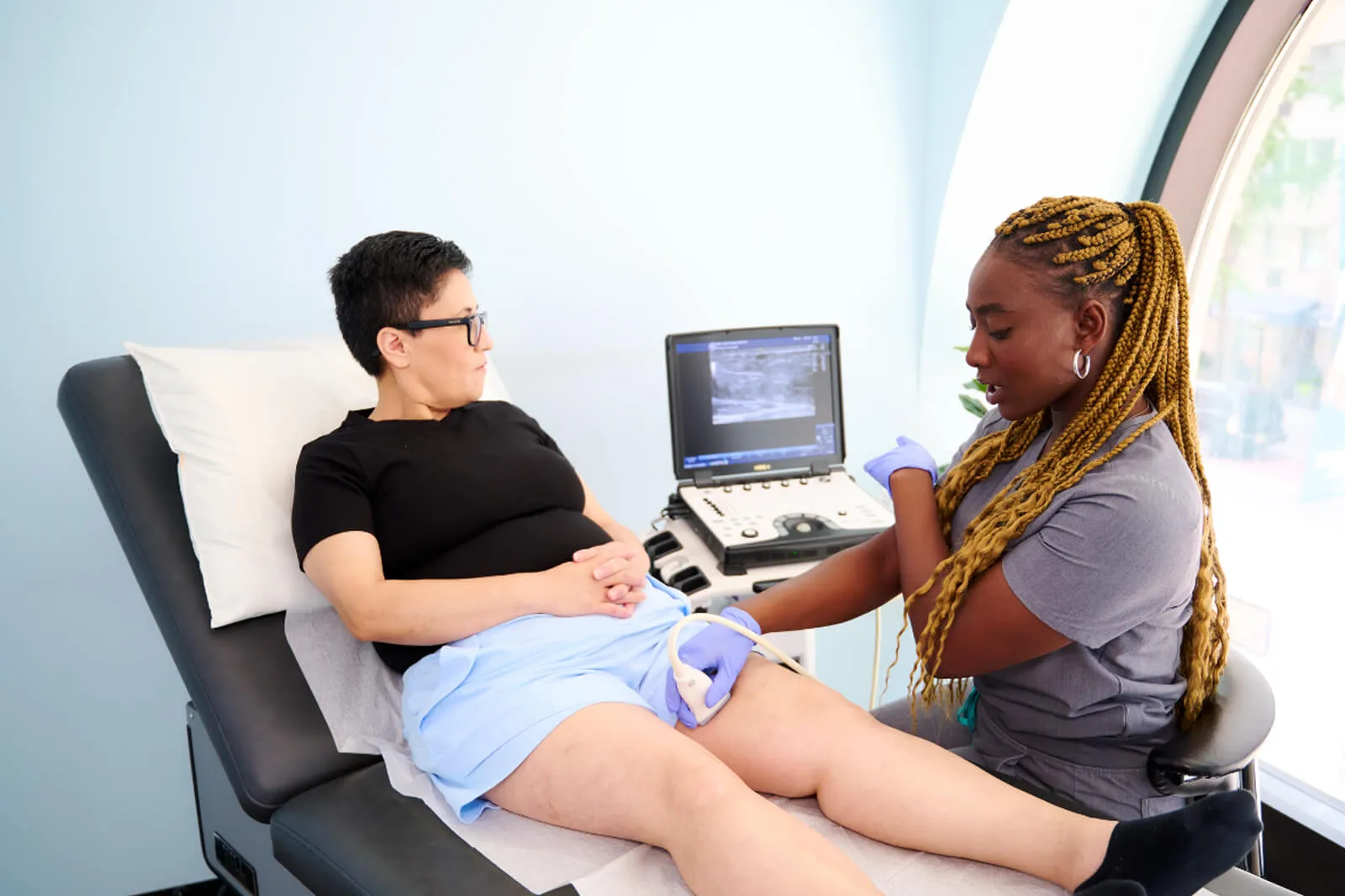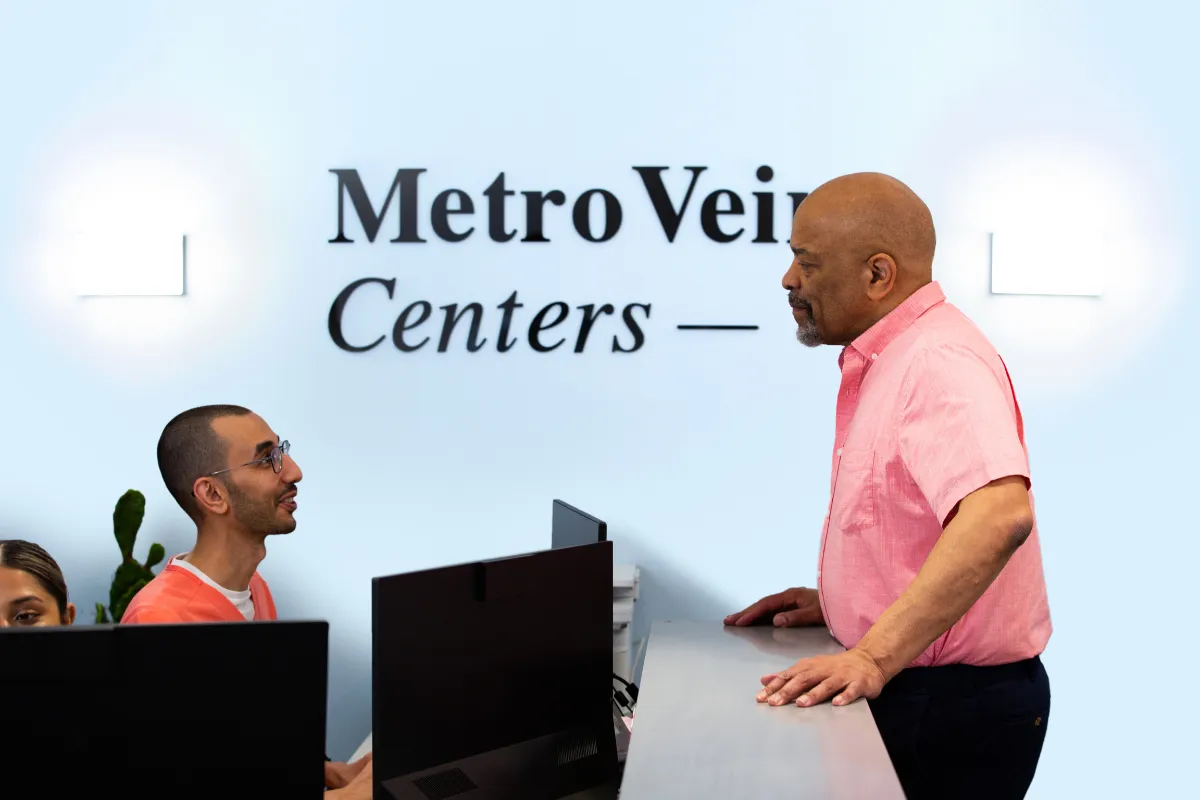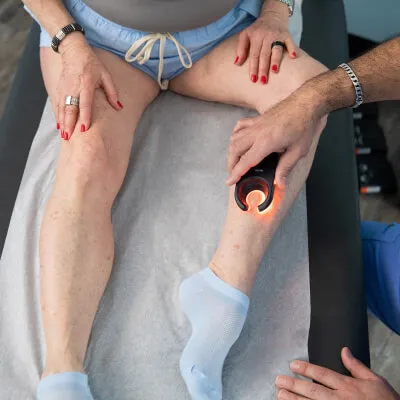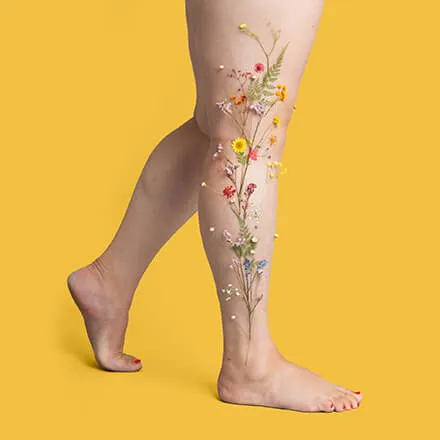The Importance of Early Detection and Treatment of Vein Disease
Behind the veil of everyday health concerns lies a silent threat that often goes unnoticed until it reaches its advanced stages: chronic venous insufficiency (CVI), also known as vein disease.
Vein disease is a progressive condition that can lead to debilitating symptoms and severe complications if left untreated. In this article, we delve into the importance of early detection and treatment of CVI, exploring its stages, symptoms, and potential risks.
Vein disease affects one in three adults. CVI is widely underdiagnosed, undertreated, and under-discussed -- but we're hoping to change that!

Understanding Chronic Venous Insufficiency
Chronic venous insufficiency occurs when the valves in the veins of the legs fail to function properly, leading to impaired blood flow back to the heart (venous reflux) and causing a variety of symptoms in the legs, ranging in severity from mild to serious.
CVI is not a static condition; it progresses over time if left unchecked. In its early stages, patients may experience mild symptoms such as spider veins, leg cramps, or a feeling of heaviness in the legs.
However, as the condition advances, symptoms can worsen significantly.
Types of Vein Disease
Any disorder that begins in and affects veins in the leg is classified as vein disease. If left untreated, these vein diseases create a number of uncomfortable symptoms and lead to varying complications.
Common vein disease types include:
- Blood clots
- Venous hypertension
- Deep vein thrombosis (DVT)
- Superficial thrombophlebitis
- Varicose veins
- Spider veins (telangiectasia)
- Chronic venous insufficiency
Stages of Chronic Venous Insufficiency
Chronic venous insufficiency is classified into multiple stages of severity, each reflecting the progression of vein disease. While these stages detail specific symptoms, it's important to note that these symptoms can occur in any stage and vary patient to patient.

- Stage 0: This is the asymptomatic stage. However, some people may experience dull achiness or tired legs.
- Stage 1: Blood vessels in the leg are visible through the skin, referred to as Spider veins.
- Stage 2: Visible varicose veins that are approximately 3 mm wide.
- Stage 3: Swelling in and around the affected area, commonly called edema.
- Stage 4: Changes in the texture or color of skin in the affected area.
- Stage 5: Ulcers appear but heal.
- Stage 6: Ulcers appear and are active.
Because vein disease is progressive, symptoms will continue to escalate until the issue is addressed. These painful and uncomfortable experiences are your body's way of alerting you that something is not right -- and it's best to listen to these cues before the symptoms greatly impact your quality of life.
Proactively treating vein disease is the safest action and prevents worsening symptoms and the development of severe or potentially life-threatening health issues.
Early Signs and Symptoms
The beginning stages of chronic venous insufficiency are often dismissed because the symptoms are infrequent and don't impact daily living. They're also dismissed because people relate the symptoms to other causes.
These symptoms include:
- Aches and pains
- Light leg cramping, Charlie horse
- Swelling in ankles (that improves when you elevate your legs)
- Spider veins
If you experience these symptoms, don't write them off as unavoidable parts of aging!
If you feel sensations in your legs like discomfort, cramping, itching (in the absence of bug bites or rash), or tingling, our vein specialists recommend that you come to a clinic to speak with a professional about your concerns.
It can't hurt to rule out the underlying cause with a vein evaluation, just to be on the safe side.
Moderate Symptoms
As vein disease progresses, your body will become more insistent that you seek medical attention. At this stage, you may begin to experience:
- Restless legs that interrupt your sleep and make it difficult for you to enjoy your leisure time in comfort.
- Swelling and edema that make it difficult to visually separate the ankle from the lower leg.
- Burning sensations accompanied by itching or tingling.
- Aching in your legs that may limit your mobility or time spent being active.
- Visible varicose veins that bulge against the skin. These twisted, cord-like veins are distorted from their original state due to malfunctioning vein valves and compromised walls.
When symptoms interrupt your sleep, it is time to contact a vein specialist near you and schedule an appointment for medical assistance. Your ability to rest is integral to all aspects of your life, as is the health of your circulatory system.
Severe Symptoms
In its later stages, vein disease takes a very obvious, visual toll on the legs. Bigger and even more alarming health concerns may emerge. It is critical to seek medical treatment if you see any of the following symptoms of the late stages of severe vein disease.
- Venous ulcers: These are wounds born from long-standing vein disease. They can appear on the skin, but unlike traditional wounds, they do not heal. Venous ulcers can greatly increase the risk of infection due to breaches of the skin barrier.
- Skin weeping: This happens when fluid seeps from the skin. This fluid may be clear or coloured.
- Skin changes: Thick, coarse-textured skin may be present on the legs, which can be painful. Some patients may even experience eczema-like dryness and flakiness, while others may experience a darkening or reddening skin.
The presence of these symptoms can affect mobility, limiting movement or ability to stand for prolonged periods. This in turn contributes to limitations on daily activities and a sedentary lifestyle, which can further worsen the symptoms of vein disease. With these limitations, some individuals progress to the state of being bedridden, while others may start using mobility aids like canes, walking sticks, or walkers.
Risk Factors for Vein Disease
The risk factors for vein disease include:
- Age
- Family history
- Obesity
- Pregnancy (and other hormonal changes)
- Prolonged standing
- Prolonged sitting
- Smoking
- Leg injuries
People who have previously experienced deep vein thrombosis or blood clots in the leg are also at increased risk of developing leg disease.

Diagnostic Methods for Early Detection
Your vein specialist will conduct a physical examination to look for signs of vein disease. They will examine the appearance of your leg, checking for changes in the skin's temperature, texture, and color. They will also check for visible abnormalities, such as swelling or protruding veins.
Afterward, the medical team will use an ultrasound to examine the vein more closely. Ultrasound images provide the doctor with a clear view of blood flow and help uncover any narrowing or blockages, such as the potential presence of one or many blood clots in the body, also known as DVT.
Benefits of Early Detection
Early detection and treatment of CVI are crucial to prevent its progression, limit discomfort and pain, and mitigate the associated symptoms and complications. Seeking medical attention at the first signs of vein disease and scheduling minimally invasive vein treatments can dramatically improve your quality of life.
By addressing CVI in its early stages, patients can improve their quality of life, reduce the risk of complications, and avoid the debilitating effects of advanced vein disease.
Treatment Options for Early-Stage Vein Disease
Treated veins will not reappear. Treatments are minimally invasive, complete in 30 minutes (on average). No bed rest, hospital stay, or even anesthesia is required. Patients can walk or drive themselves home after their appointment, immediately returning to their day-to-day routine, with slight adjustments for those who regularly participate in strenuous activities such as vigorous exercise or heavy lifting. Additionally, your vein specialist can share lifestyle modifications to help improve your vein health.
At Metro Vein Centers, we offer vein evaluations for all incoming patients, where our board-certified vein doctors will customize a treatment plan unique to your exact symptoms, concerns, and lifestyle.
Modern advancements in vein treatment technology have allowed for a wide variety of gentle, effective, and FDA-approved treatments to become available, often covered by insurance as a medical necessity.
They include:
- Compression therapy
- Ambulatory phlebectomy
- Radiofrequency ablation
- Endovenous laser treatment or radiofrequency ablation
- Sclerotherapy
- Ligation
- VenaSeal
- Varithena(TM)
We care very much about raising awareness, promoting proactive healthcare, and preventing unnecessary suffering. Vein disease is often hereditary, and despite even the healthiest, most active lifestyles, individuals may develop varicose veins simply because others in their family had them. Seeking treatment and experiencing success may cause a domino effect in your community, showing family and friends that they don't have to live with the pain and discomfort associated with vein disease.
Complications of Untreated Vein Disease
Vein disease can lead to conditions that require emergency care, such as the development of deep vein thrombosis (DVT), a blood clot in a deep vein. When deep veins become diseased, it is not often visible to the naked eye in the same way as when varicose veins appear near the surface of the skin. DVTs can go undetected for quite some time. If a DVT forms in the legs, it does have the potential to travel to the lungs, causing a pulmonary embolism (blood clot in the lungs), which can be fatal.
Other complications include:
- Lipodermatosclerosis
- Chronic vein ulceration
- Recurrent cellulitis
- Secondary lymphedema
- Chronic pain
- Superficial thrombophlebitis
- Venous eczema
When to See a Vein Specialist
Warning signs of a DVT are oftentimes asymmetrical. Symptoms may include tightening or firmness of the skin due to swelling, skin that is hot to the touch, and skin that is red or painful. DVTs are a concern for those suffering from severe symptoms of chronic venous insufficiency, and this health issue may require the care of emergency room staff due to the dangerous nature of the blood clot. Taking a proactive approach to your vein health is a great way to minimize the risk of developing a DVT.
The Role of Regular Vein Screenings
Regular vein screenings are important for identifying vein disease in its early stages. Individuals showing early signs of the disease can prevent it from worsening by making lifestyle modifications or using non-invasive treatments.
At times, a regular vein screening can be a matter of life and death. Blood clots may develop without causing pain or swelling but silently pose a risk of breaking away and lodging into other areas of the body, such as the lungs. When these clots are discovered quickly enough, the patient can take blood thinners or undergo other forms of treatment to remove them, decreasing the risk of life-threatening complications.
Lifestyle Changes for Vein Health
Making lifestyle changes can greatly improve vein health and lower the risk of developing vein disease. Regular walking, for instance, can enhance blood circulation throughout the body, particularly in the legs. Elevating the legs when sitting can help prevent blood from pooling, which reduces the risk of blood clots.
Other lifestyle changes for vein health include:
- Reducing the intake of salt to lower high blood pressure.
- Reducing the consumption of cholesterol and hydrogenated fats.
- Reducing weight by adopting healthy dietary and fitness changes.
- Wearing loose-fitting clothing.
- Drinking plenty of water and hydrating liquids to avoid dehydration.
- Eating fibre-rich foods reduces abdominal pressure.
We've Got You Covered
Our team of board-certified vein specialists offers free vein evaluations in all of our New York, New Jersey, Connecticut, Michigan, Texas, Arizona, and Pennsylvania vein clinics. We offer minimally invasive and 100% non-invasive vein treatments for varicose veins, spider veins, and other painful or uncomfortable symptoms of vein disease. Our team is happy to answer any inquiries about treatment options, scheduling, or insurance coverage -- in fact, we accept over 200 insurance plans in our clinics!
Our state-of-the-art vein treatments can be performed in under 30 minutes, in our accredited vein clinics, by our certified vein doctors. Give us a call at 866-353-5558 to schedule your free vein evaluation and get started on your vein treatment journey!
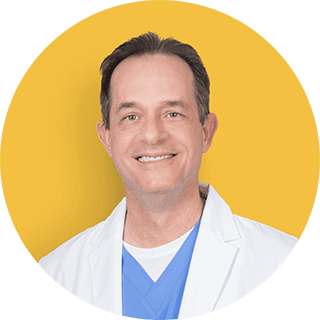
Dr. Philip LoPresti
Meet Dr. Philip LoPresti DO, DABVLM, FACS, a board-certified vein specialist and surgeon with over 20 years of experience. Schedule an appointment with him in Queens, NY today.
Meet Dr. Philip LoPresti
Trusted insight from the nationally accredited, board-certified vein doctors at Metro Vein Centers.


